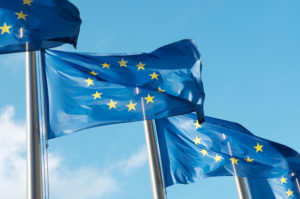Highlights from the Past Week
CW 20 / Monday, 16 to Thursday, 19 May: Mini Plenary Sessions Week (Brussels);
DIGITAL MARKETS ACT – EP COMMITTEE APPROVES TRILOGUE RESULT: Last week, the European Parliament’s Internal Market Committee approved the final text of the Digital Markets Act (DMA) endorsed by negotiators in March. Committee members voted 43-1 in favour of the text, with one abstention. The text still has to be approved by the plenary of the Parliament.
DIGITAL SERVICES ACT – FRANCE GRAPPLING WITH ITS ROLE AND FINALISATION: The Digital Services Act (DSA) is facing last-minute reservations in the European Parliament. As Politico Pro (paywall) reports, the liberal Renew group and the left-wing Green group are complaining about problematic changes that appeared in the current text version last week (PDF).
Three points stand out:
- The stay-down obligation: Renew and the Greens indicate concerns about an amendment in a preamble. According to the groups, the amendment could force digital companies to ensure that illegal content does not reappear on their platforms after it has been taken down. The Parliament had opposed such an obligation during the negotiations.
- Deadlines for take-downs: Renew and the Greens also criticised a new reference to a 24-hour deadline for removing illegal content in the EU Code of Conduct on Countering Illegal Hate S The Parliament also opposed such a deadline.
- Ban on targeted advertising: The Greens noted that the text of the DSA did not reflect the political agreement on banning targeted advertising when it comes to sensitive data.
But even within the Council, France is rumoured to be making no friends with its approach to the technical negotiations.
HATE SPEECH – COUNCIL OF EUROPE CALLS FOR MORE MONITORING: Forty-six countries – including France, Germany, Belgium and Ukraine – have called on digital companies to step up efforts to combat hate speech on the Internet in a joint declaration adopted at a Council of Europe Committee of Ministers meeting on 20 May. In doing so, the ministers want online platforms to ensure that artificial intelligence used to moderate content is monitored by people with knowledge of the relevant languages and different national contexts.
DATA GOVERNANCE ACT – FINAL APPROVAL IN THE COUNCIL: Last week, the Council of the European Union approved the trilogue result (PDF) of the Data Governance Act (DGA) reached in November. The European Parliament had already approved the text on 6 April. The DGA will accordingly soon be published in the Official Journal of the Union and will enter into force 20 days after publication.
DATA ACT – FURTHER DELAY TO BE EXPECTED IN THE EP: The four committees with an interest in engaging in the Data Act had until 20 May to agree on how it would be allocated. However, only the Civil Liberties Committee (LIBE) managed to reach an agreement with the lead Industry Committee (ITRE). In particular, LIBE was given responsibilities for provisions related to the GDPR.
Discussions with the Legal Affairs Committee (JURI) and the Internal Market Committee (IMCO), on the other hand, are likely to drag on. ITRE declined the request to grant JURI joint committee status and instead offered to share competence for the provisions on the Database Directive. On its part, IMCO wants to be given exclusive competence for Chapters 6 and 8.
It will accordingly fall to the Conference of Committee Chairs (CCC) to come to a decision. This will then have to be approved by the Conference of Presidents (COP). The process will therefore take several more weeks and is not expected to be completed until the beginning of July at the earliest. (see Contexte, paywall, FR)
ARTIFICIAL INTELLIGENCE – NEW FRENCH PROPOSAL: The French Presidency of the Council has issued a new compromise text (PDF) on the AI Act, proposing changes to the transparency obligations on different AI systems.
The document was on the agenda of the Telecommunications Working Group on 17 May. It marks the latest in a series of compromise texts issued by France. These include proposals to change the powers of market surveillance authorities, the scope of the legislation’s Code of Conduct and the structure of the European Artificial Intelligence Board’s structure – the body that will advise on the legislation’s implementation. One of the modifications made in the new draft is the inclusion of a definition of a “general-purpose AI system”. (see Euractiv)
FACIAL RECOGNITION – EDPB REPEATS DEMAND FOR BAN: Europe’s network of data protection authorities declared last week that it had adopted guidelines on facial recognition and repeated its call for a ban on the use of facial recognition technology in certain cases. In particular, the EU data protection authorities called for a ban on remote biometric identification of individuals in publicly accessible spaces, and on facial recognition systems categorising individuals based on their biometrics into clusters according to ethnicity, gender, political or sexual orientation or other grounds for discrimination.
The EDPB also called for a ban on facial recognition used to infer emotions. They argue that law enforcement agencies should not be allowed to process personal data based on online photos – a controversial practice used by the US company Clearview.
EIDAS – FRENCH COUNCIL PRESIDENCY HANDS OVER REINS TO CZECHIA: On 17 May, the French forwarded their progress report (PDF, FR) on the EU regulation on electronic identification and trust services (eIDAS) to Czechia. Key points on which Member States still have questions include the European Digital Identity Wallet (EDIW) and the way it is connected to national electronic identification means, as well as its level of security. (see Contexte, paywall, FR)
INFRASTRUCTURE – NETWORK CONTRIBUTION VIA PLATFORMS REJECTED BY EP: The European Parliament Committee on Industry, Research and Energy (ITRE) has rejected the Council’s position on network contribution, saying that payment by big tech firms does not follow the principle of net neutrality.
Last week, the committee adopted a compromise text that removed the European Council’s associated reference to network contribution and instead included a connected idea. The text says that “convergent conditions for investment in digital infrastructures” are needed for all market actors to benefit from the digital transformation and “assume their social responsibilities and contribute to a competitive and functioning environment”.
This “better reflects the respect of the principle of net neutrality”, said a spokesperson from Martina Dlabajova, ITRE rapporteur from Renew. (see Euractiv)
FRANCE – COOKIE WALLS: YES, BUT: For the French regulator CNIL, making access to a website conditional on the installation of trackers on the user’s computer is lawful. But only if a “real and fair alternative” is offered. The CNIL, whose guidelines in this regard were partially annulled by the French Council of State in June 2020, has published assessment criteria which are intended to bridge the gap until the final ruling of the European Court of Justice has been made.
Accordingly, a paid alternative to acceptance of cookies is conceivable, but only at a “reasonable” price. However, the CNIL does not see the setting of this price as its task. Rather, each publisher must be in a position to decide upon and justify such a price. Moreover, it is not forbidden in principle to oblige users to set up an account if there is a corresponding justification. Moreover, consent to the setting of relevant cookies is not the same as consent to all cookies, warns the CNIL, for which the publisher must demonstrate that its cookie wall is limited to purposes that allow adequate remuneration for the service offered. (see Contexte, paywall, FR)
MINIMUM TAX – EP PUSHES FOR QUICK ADOPTION: On Thursday, the EU Parliament approved a Commission proposal implementing the international agreement on a global minimum corporate tax rate of 15%.
The text approves the key elements of the Commission’s proposal, notably sticking to the proposed implementation timeline and an implementation deadline of 31 December 2022 with the intention of a swift application of the law.
MEPs did however make changes to the Commission’s proposal. In particular, they introduced a review clause which provides for the revision of the annual revenue threshold above which a multinational corporation would be subject to the minimum tax rate. They also want an assessment on the impact of the legislation on developing countries.
MEPs also seek to reduce certain exemptions proposed by the Commission, and to limit the possibility for abuse of the rules, notably by introducing a special article containing rules to fight tax avoidance schemes. (see EP press release)
ONLINE POLITICAL ADVERTISING – EP TIMETABLE: The lead Single Market Committee on the EU regulation on political advertising plans to finalise its report on 15 June, according to a recent timetable (see Politico Pro, Paywall). On 11/12 July, the rapporteur plans to present his amendments to the committee, and MEPs are to be able to submit amendments until 7 September. A vote in the Internal Market Committee on the report will then only take place on 28/29 November or in January 2023.
PATH TO THE DIGITAL DECADE – EP COMMITTEE ADOPTS REPORT: On Tuesday, members of the European Parliament (MEPs) adopted a roadmap for digital skills, infrastructure, businesses and public services.
The adopted plan will set EU-wide digital targets to be achieved by 2030 via a joint effort by Member States and the Union level, as well as through joint investment. It aims in particular to:
- ensure that 80% of the population aged 16-74 have at least basic digital skills,
- deploy 10,000 climate-neutral, highly secure edge nodes,
- bring at least 75% of European enterprises to use cloud computing services, Big Data and artificial intelligence,
- ensure that more than 90% of European SMEs should have reached at least a basic level of digital intensity.
The scheme also aims to ensure that democratic life and public services are fully accessible online for everyone, and that all EU citizens have access to their medical e-records by 2030. (see EP press release)
COPYRIGHT – COMMISSION URGES MEMBER STATES TO FULLY TRANSPOSE EU RULES: The Commission decided last week to send reasoned opinions to Bulgaria, Cyprus, Greece, Ireland, Latvia, Poland, Portugal, Slovenia, Slovakia and Finland, given that these countries have not yet notified the Commission on transposition measures on copyright and related rights applicable to certain online transmissions (Directive (EU) 2019/789, SatCab2).
In addition, the Commission has decided to send reasoned opinions to Belgium, Bulgaria, Cyprus, Denmark, Greece, France, Latvia, Poland, Portugal, Slovenia, Slovakia, Finland and Sweden for not yet having notified the Commission of transposition measures on copyright and related rights in the Digital Single Market (Directive (EU) 2019/790). (see press release COM)
AUDIOVISUAL MEDIA SERVICES – COMMISSION TAKES FIVE MEMBER STATES TO COURT OF JUSTICE: The European Commission has decided to refer Czechia, Ireland, Romania, Slovakia and Spain to the Court of Justice of the European Union over the failure to transpose the revised Audiovisual Media Services Directive (EU) 2018/1808). (see press release COM)
TTC – EU AND US WANT TO STRENGTHEN TRANSATLANTIC PARTNERSHIP: The EU and the US want to work more closely together to tackle global challenges in the areas of trade and technology. At the second Ministerial Meeting of the Trade and Technology Council (TTC) in Paris, both parties reiterated the central role of this initiative for the renewed transatlantic partnership. “Russia’s war of aggression against Ukraine has further underlined the key importance of our cooperation with the US on economic and technology issues. This cooperation goes beyond our reaction to the war. Together with our transatlantic partners, we can create a positive vision for our economies and for a democratic governance of the Internet based on the dignity and integrity of the individual”, said Executive Vice-President Margrethe Vestager. “When we act together, we can set the standards of tomorrow’s economy. We are joining forces and when two such determined partners take the lead, we can enable the tides tot turn.” (see press release COM)
Relevant Publications, including from the EP Think Tank:
- Global minimum level of taxation for multinational enterprises in the EU (At a Glance)
- Artificial Intelligence and the fisheries sector (Study)
- The EU’s digital market [What Think Tanks are thinking] (Briefing)
- Plenary round-up – May II 2022 (At a Glance)
Outlook for the Current Week
You can find a list of the upcoming dates of the European Parliament here. The meeting calendar for 2022 can be found here (PDF).
A (meetings-free) Green Week is scheduled for the coming week. This is to be taken advantage of by an IMCO Committee delegation, who will travel this week to Silicon Valley for talks.
An overview of the most important dates of the Council week can be found here, the meeting calendar can be accessed here, and the list of the main topics for the coming fortnight is available here.
Included among these dates are:
Summits and Ministerial Meetings:
- General Affairs Council, Monday, 23 May – Agenda, A Items
- European Economic Area Council, Monday, 23 May – Agenda;
- Agriculture and Fisheries Council, Tuesday, 24 May – Agenda, A Items;
- Economic and Financial Affairs Council, Tuesday, 24 May (incl. global minimum tax) – Agenda, A Items;
Preparatory Bodies:
- Working Party on Hybrid Threats, Monday, 23 May;
- Working Party on Telecommunications and Information Society (incl. eIDAS), Monday, 23 May;
- Working Party on Competitiveness and Growth (Internal Market), Monday, 23 May;
- Working Party on Cooperation in Criminal Matters (COPEN), Monday, 23 May and Wednesday, 25 May;
- Working Party on Tax Questions (Direct Taxation), Monday, 23 May and Wednesday, 25 May;
- Working Party on Competitiveness and Growth (Industry), Tuesday, 24 May;
- Horizontal Working Party on Cyber Issues, Tuesday, 24 May;
- Working Party on Consumer Protection and Information, Wednesday, 25 May;
- Working Party on Intellectual Property, Monday, 25 May;
- COREPER I, Wednesday, 25 May;
- COREPER II, Wednesday, 25 May;
Information on the weekly Commission Meeting can be found in the preview (PDF) or (at short notice) in the current agenda. A topic of particular relevance is the Media Freedom Act (29 June).
The following topics are on the agenda for the coming week:
- Proposal for a Directive on asset recovery and confiscation
- Proposal for a Council decision on adding the evasion or violation of sanctions to the areas of crime laid down in Article 83(1) TFEU
You can find the judicial calendar of the ECJ here.
European Parliament Committees
CW 21 / Monday, 23 to Friday, 27 May: Green Week (no meetings);
LIBE Committee (EP)
Current Meetings
- None
Further Meetings (Calendar)
- Monday, 30 May 2022, 16.45-18.45 (Brussels)
JURI Committee (EP)
Current Meetings
- None
Further Meetings (Calendar)
- Monday, 2 June 2022 (Brussels)
Dossiers Timetable (10 May 2022)
ITRE Committee (EP)
Current Meetings
- None
Further Meetings (Calendar)
- Monday, 2 June 2022, 9.00-12.00 (Brussels)
Dossiers Timetable (18 May 2022)
IMCO Committee (EP)
Current Meetings
- None
Further Meetings (Calendar)
- Open
Dossiers Timetable (May 2022)
CULT Committee (EP)
Current Meetings
- None
Further Meetings (Calendar)
- Wednesday, 15 / Thursday, 16 June 2022 (Brussels)
Further Scheduled Parliamentary Calendar Dates
- CW 22 / Monday, 30 May to Thursday, 2 June: Political Group and Committee Meetings Week (Brussels);
- CW 23 / Monday, 6 to Thursday, 9 June: Plenary Sessions Week (Strasbourg);
- CW 24 / Monday, 13 to Thursday, 16 June: Committee Meetings Week (Brussels);




